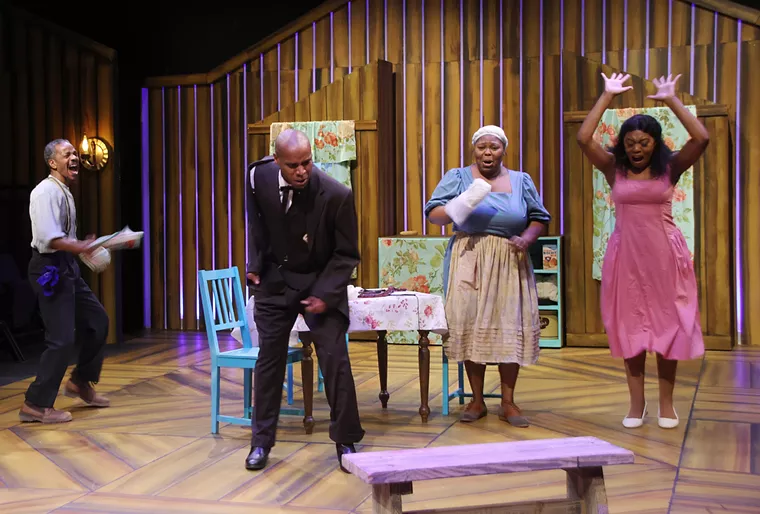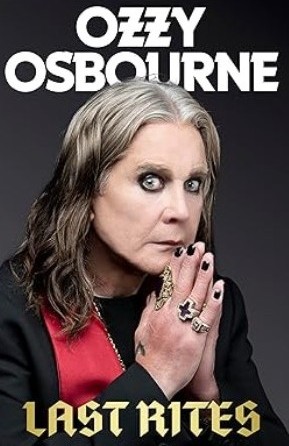Review: Purlie Victorious: A Non-Confederate Romp Through the Cotton Patch at Main Street Theater
Despite Ossie Davis’s Purlie Victorious: A Non-Confederate Romp Through the Cotton Patch garnering some famous fans after opening in 1961, folks like Martin Luther King, Jr., Malcolm X, and Eleanor Roosevelt, and eventual film and musical adaptations, the play didn’t get a Broadway revival until 2023.
The revival proved the play still had plenty to say, so much so that it’s now the first production of Main Street Theater’s 50th anniversary season, and it’s a doozy.
But first.
The play begins in the recent past with the titular Purlie Victorious Judson returning home after a 20-year absence. Purlie’s family home sits on a Georgia cotton plantation owned by the bullwhip-carrying, Confederacy-loving Ol’ Cap’n Cotchipee, who keeps the Black cotton pickers in debt to keep them working for him, a practice Purlie sees akin to slavery. But Purlie’s back with a plan, the “all-consuming passion” of his life now to buy Big Bethel, a rundown barn that was once a church, and return it to its glory so he can preach freedom in the cotton patch. As Purlie says, “Freedom is my business.”
To get Big Bethel, though, Purlie needs money; specifically, the $500 inheritance Cotchipee owes his late cousin Bee. Enter Lutiebelle Gussie Mae Jenkins, a young woman Purlie’s recruited from Alabama to impersonate Cousin Bee. Though Purlie has a supporter in his sister-in-law, Missy, his brother, Gitlow, is afraid Purlie’s scheme will land them all in jail, a risk he is loath to take as Cotchipee recently named him “Deputy for the Colored.” On top of that, Lutiebelle looks nothing like Bee, nor does she have Bee’s education. But for this, Purlie’s got an ace up his sleeve: “White folks can’t tell one of us from another by the head!” he declares.
Kendrick “KayB” Brown, TiMOThY ERiC, Wykesha King, and Krystal Uchem in Main Street Theater’s production of Purlie Victorious: A Non-Confederate Romp Through the Cotton Patch by Ossie Davis.
Photo by Pin Lim / Forest Photography
It’s hardly a spoiler to say things don’t go exactly to plan in Purlie Victorious, a still stinging satire that proves to be resonant today, 64 years after it originally premiered. It’s both a testament to Davis’s writing and, unfortunately, an indictment of our society. The dialogue is witty and memorable, with lines like, “Some of the best pretending in the world is done in front of White folks,” eliciting knowing hums from members of the audience.
Director Errol Anthony Wilks keeps the show moving and accessible, though his choice to lean fully into the comedy is at times at the expense of letting the play’s more serious beats breathe (Lutiebelle laundry-listing her best traits for a second time following an encounter with Cotchipee, for example). Davis’s characters are sketched in broad strokes from stereotypic archetypes, but subversive in places and bold in others, and Wilks and the cast are skillful at playing those notes. And there’s no one more bold than Purlie himself.
Davis not only wrote Purlie Victorious, he originated the role, and you can tell it’s a part he wrote for himself it’s so good. Purlie is a hero, quick and clever, and wonderfully verbose. And TiMOThY ERiC, recent co-winner of the Houston Theatre Award for Best Actor, wears the role of Purlie like a second skin.
“Something about Purlie always wound up the white folk,” says Missy, and embodied by ERiC, it’s easy to see the threat he poses, his delivery convincing, captivating, and wildly entertaining. It’s fully on display in the second act, as Purlie is in full sermonizing mode as he recounts his alleged confrontation with Cotchipee, traversing the stage and holding court in a way that’s got the other characters and the audience hanging on every word. He’s just as good at slipping in some quieter one-liners (“First chance I get I’m gonna burn the damn thing down,” Purlie says of his childhood home).
If there’s one thing, it’s that at moments, the louder ERiC gets, the more likely we are to miss a word here and there, some bits just lost to the ether.
(The sound design, by Jon Harvey, is otherwise stellar, from the place-defining banjo-picking played during transitions, to the crystal clarity of the off-stage dialogue, and the ambience, chicken clucks and dog barks heard under scenes adding weight to the world of the plantation.)
Seán Patrick Judge and Domenico Leona in Main Street Theater’s production of Purlie Victorious: A Non-Confederate Romp Through the Cotton Patch by Ossie Davis.
Photo by Pin Lim / Forest Photography
From the moment she arrives at the farmhouse, breathless and wide-eyed, Krystal Uchem endears as Lutiebelle, a young woman proud of who she is even when she’s being criticized (such as when Purlie insults her name, saying, among other things, it means “cheap labor in Swahili”). Uchem plays the physicality of the role well, from the way she sits to eat, leaning forward with her legs akimbo, emphasizing her youthfulness, to half-hunched and hobbling, unaccustomed to heels, as she tries in vain to be Cousin Bee.
Wykesha King is a force as Missy, as quick to challenge Purlie as she is to see the value in what he’s trying to do. As her husband, Gitlow, Kendrick “KayB” Brown is more of a foil to Purlie. Gitlow plays the game, sensible in his subservience and willing to say anything Cotchipee wants to hear, though behind Cotchipee’s back, it’s a different, and hilarious, story.
Seán Patrick Judge is quite the presence as Ol’ Cap’n Cotchipee. Stalking onto the set and dressed in all white, we know exactly who he is before he even starts ranting, raving, and dropping some vile ideas about race. Cotchipee has support from The Sheriff, played with on-the-nose ineptitude by Jim Salners, but not his son, Charlie, whom he calls a “disgrace to the Southland.” Domenico Leona, as Charlie, proves to be an ally to Purlie and co., influenced obviously by his sweet relationship with Andrea Boronell-Hunter’s Idella. Idella, who works for Cotchipee, raised Charlie as her own, and it’s apparent how close they are in just how lost she sounds when Charlie goes missing.
James V. Thomas’s wood-paneled set, with props design and set dressing by Rodney Walsworth, is both a good base and nimble. The sparse furnishings and flippable walls are quickly altered to indicate new locations as needed, with the angles and lines that dominate the space adding a compelling and relevant visual. The set, as well as Macy Lyne’s period-evocative costumes, are all warmly lit by Edgar Guajardo.
Put it all together, and you have a lively, energetic production with heart and conviction. Perfect to open a 50th anniversary season.
Performances will continue at 7:30 p.m. Thursdays through Saturdays and 3 p.m. Sundays through October 12 at Main Street Theater – Rice Village, 2540 Times. For more information, call 713-524-6706 or visit mainstreettheater.com. $45-$64.

Reign Bowers is an outdoor enthusiast, adventure seeker, and storyteller passionate about exploring nature’s wonders. As the creator of SuperheroineLinks.com, Reign shares inspiring stories, practical tips, and expert insights to empower others—especially women—to embrace the great outdoors with confidence.






Post Comment